Making mountains out of meltdowns (in Japan)
-
I'm trying to figure out if this is about media sensationalism or radiation. I can debate the media but not qualified to discuss radiation.
-
It's about both.

It's not just the media - it's everyone who comments on this - they have their own agenda and tell you their version of the 'truth' to suit their own ends.
These ends might be to reassure you that it's not as bad as you might think, or it's worse than you might think, or whatever - we can guess but don't know for sure...
What saddens me is the lack of real insight in all of this commentary - OK... I don't expect to understand exactly what a 'millisievert' is, or what a certain number of them might do to me - however, I'd like some indication of what a normal range of 'radiation' is from natural sources like radon, cosmic rays, ill-considered atmospheric testing when I was younger and the like... and what varying degree of additional radiation might come from the possible problems at a faulty nuclear reactor - and what that might do. For all the hours of media commentary where are the simple facts... 'Levels at the plant gates is 8 times normal' - what does that really mean??
For example where I live in the NE UK I do know that I have a relatively low exposure to 'natural radiation', but someone living in Madrid will have much higher natural exposure [perhaps x10 than me?], and then does their frequent flights to the States and their annual X-rays/MRI scans raise this to dangerous levels ?? Where's the info that might be really useful to us ?
They roll out all their 'experts', but none of them tell us more than we could already guess - if Fukushima is contained and controlled it's 'probably OK' in the medium term, or if it goes badly wrong then there's some sort of 'big problem'!
The media gurus and even President Obama's advisers can't even get the name of the plant right - they keep calling it "Fukushima Daiichi" - which means 'Fukushima #1' - i.e. the first reactor on this site. Ironically "Fukushima" means "Fortunate Island" ( ).
).
The second reactor is called 'Fukushima Daini' [#2], the third one 'Fukushima Daisan' [#3] etc.
By now we all know that although the first one was initially reported as faulty, the first one to really 'break' was #3 [then #2, then #1, then #4 - after that they took random turns at being the main problem of the day!]... but when did you hear someone call it 'Fukushima Daisan' etc ? 'Fukushima Daiichi' is still used by many commentators to mean the whole site - but it's not.
If they can't even get the reactors' simple names right then what hope might have we of trusting their broader advice/commentary - either good, bad, reassuring or worrying ???
-
From an American perspective
It’s not only about media selling airtime, or Japan doing damage control IMO.
It’s about the debate that got started recently in the states regarding nuclear power, Obama is pro Nuclear power, the right is anti everything Obama, so come Japan meltdown (if indeed it is one) and the right wing have a case to dismiss Obama’s enthusiasm and show him up.
But it’s not all politics, it’s big business, I live in Texas and we do have nuclear power stations, however we have a governor who is in the coal industry pocket, this issue is big here and the coal companies are winning it, thanks to Rick Perry. (gov Texas) -
Dear TIG,
A very small correction, but MRI = high magnetic fields, and not ionising radiation. The only 'known' dangers are to pacemakers and metal implants (mostly ferromagnetic materials).
We have become very risk adverse over the years. I often think of the 6,000 people who are killed every year on UK roads, but I still get in my car to drive from A to B. I accept the risk because I want the convenience of having my own transport. If we want to consume electricity at the current rate (plasma screens, computers, microwave ovens, street lighting, etc), then we are pretty much stuck with nuclear power until scientists and engineers come up with more efficient renewable energy power plants.
Radiation at any level poses a risk to health, with the probability of irreversible damage increasing with increasing dose. These days I am more concerned about the vast number of chemical compounds washing around in our environment. This article discusses persistent chemicals found in breast milk:
Perhaps not germane to the discuss, but it does suggest that perhaps relatively small radiation leaks should not be at the top of our 'shock horror' lists.
Regards,
Bob -
Facts that we can see here in Europe from Japan for Fukushima Plant
1000 millisieverts by hours today reactor N°2
No more possibility to access!
(1000 millisieverts by year is admissible in extrem emergency)Go to the worst - all the rest is futility!
Here the balises (signpost)over the France actualised each four hours
Normal for the moment 100 - 200 NanoSieverts by Hour
so for a year
200 * 24 * 365 = 1 752 000 NanoSieverts = 1.7 millisieverts
1 millisievert = 1 000 000 NanoSievertsyou can study this image
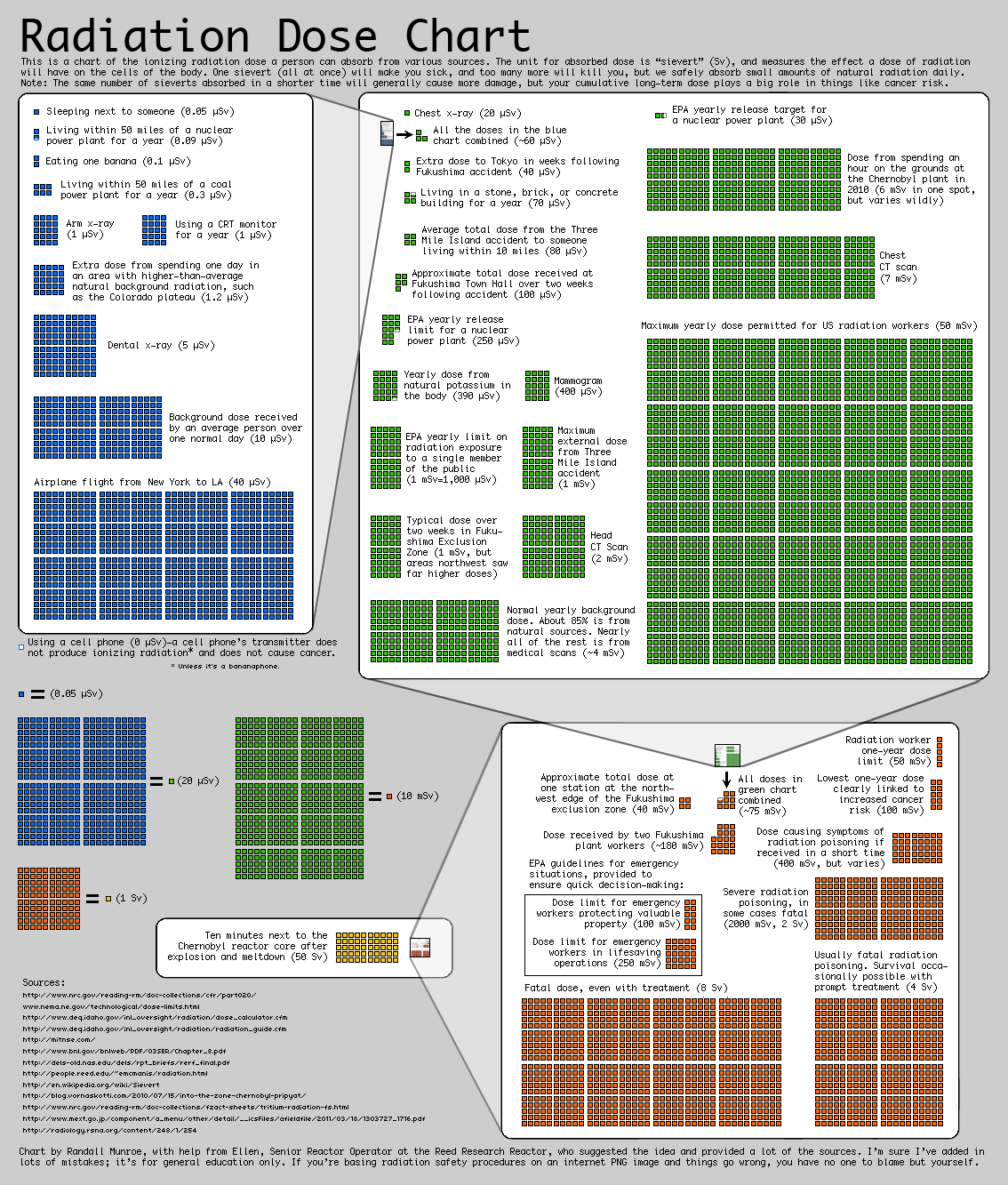
-
Another very good BBC News report;
@unknownuser said:
More than 10,000 people have died in the Japanese tsunami and the survivors are cold and hungry. But the media concentrate on nuclear radiation from which no-one has died - and is unlikely to.
Nuclear radiation at very high levels is dangerous, but the scale of concern that it evokes is misplaced. Nuclear technology cures countless cancer patients every day - and a radiation dose given for radiotherapy in hospital is no different in principle to a similar dose received in the environment.
What of Three Mile Island? There were no known deaths there.
And Chernobyl? The latest UN report (http://www.unscear.org/docs/reports/2008/Advance_copy_Annex_D_Chernobyl_Report.pdf) published on 28 February confirms the known death toll - 28 fatalities among emergency workers, plus 15 fatal cases of child thyroid cancer - which would have been avoided if iodine tablets had been taken (as they have now in Japan). And in each case the numbers are minute compared with the 3,800 at Bhopal in 1984, who died as a result of a leak of chemicals from the Union Carbide pesticide plant. http://www.bbc.co.uk/news/world-12860842
http://www.bbc.co.uk/news/world-12860842edit... getting a meltdown in my mind already. this is of course what bob posted!


-
@dale said:
The press manipulates, therefore can't be trusted. I would agree, and like to add that the information is manipulated by every source as it is disseminated.
The emphasis has been taken off the massive human disaster because that is not what will increase readers or viewers, whereas perceived impending disaster will.
I feel you lose credibility if you start to put forward the premise that exposure to radiation, particularly the radiation that could potentially leak from this, or any other nuclear based power plant, is safe and therefore of no concern.
Dale, to try and answer number one, both yes and no. In the old days where there was definitely a difference between a "left wing" and a "right wing" paper, I don't think this exists any more- even if there is a tendency for those who read the Guardian to blame Daily mail readers (they used to blame The Sun), as the 'cancer' that is affecting the UK today. I'm not a fan of the Daily Mail, but equally I find it hard to swallow news reports in the Guardian too- especially when an article has been badly researched (for eg don't get me, an Atkins diet follower, on the subject of "healthy eating", as prescribed by The Guardian newspaper! I eat cream, fat, and meat, I am loosing weight, and I've never felt more healthy, more alert and more fit!
 ). I think more research (and proper debate- which is what this is?) is the answer, and at the moment the Guardian mentions nothing but the Fukushima plant. There is virtually nothing in the paper, in the top stories section on the humanitarian crisis in the paper apart from the occasional photo essay. It's been like this ever since the earthquake.
). I think more research (and proper debate- which is what this is?) is the answer, and at the moment the Guardian mentions nothing but the Fukushima plant. There is virtually nothing in the paper, in the top stories section on the humanitarian crisis in the paper apart from the occasional photo essay. It's been like this ever since the earthquake.Nuclear power is a big subject at the moment. We are told that our planet is heating up and we are doomed. Brendan O'Neill writing in the Telegraph (also known in the UK as "The Torygraph"- although the last thing I would call O'Neill, is a Tory!);
@unknownuser said:
The response to the ongoing problems at the Fukushima nuclear reactor in Japan confirms that catastrophists have colonised the debate about nuclear power. Both those who oppose nuclear and those who support it are driven more by an irrational politics of panic than by anything resembling a cool, human-centred commitment to progress. On one side, anti-nuclear moaners argue that if we continue experimenting with plutonium and uranium then the world will be plunged into a radioactive End of Days that only cockroaches will survive. On the other side, many of those who support nuclear claim that if we don’t build more reactors then man-made climate change – or the “outraged planet” as one of them calls it – will finish us off and feast on our carcasses. It is time, surely, for a more reasoned debate about man’s energy needs and the importance of nuclear.
O'Neill then goes on to say;
@unknownuser said:
What we have here is not a serious debate about energy needs but a competition of catastrophes, a clash of apocalypse-mongers who can’t quite agree on what will damn mankind to hell: our creation of nuclear power or our burning of fossil fuels. In many ways, the anti-nuke lobby is simply behind the times: its holocaust-hungry imagination, so fashionable in the 1980s, is old hat these days, having been replaced by the Revelations-style apocalyptic thinking of the eco-outlook. Those who support nuclear only as a desperate measure to make up for humanity’s alleged crimes against the planet are doing no favours for the pro-nuclear outlook, with their promotion of fear and anti-humanism over a debate about how society might meet people’s needs and satisfy their desires. They ought to be reminded that “the nuclear age” was never simply about technology – rather it spoke to a sense of faith in humanity, in our ability to use science and reason to master the unknown and to push forward the forces of progress. They have no such faith, and see nuclear simply as a life raft for foolish and greedy human beings.
So we are left with a very marxist and humanitarian outlook from a newspaper that once was a strong supporter and advocate of the years of Thatcherism. My point is, that in order to sort the wheat from the chaff, it's vitally important to reach conclusions from whatever source (Mail, Telegraph, Guardian or BBC etc), and listen carefully to the 'experts'. The W.H.O. made a statement the other day, here on the Today programme on the levels of radioactivity, stating very clearly that there was very little to worry about, concerning eating contaminated food or water. Even the BBC, in the link that Bob provided are saying very much the same thing. And the link that Pete gave us, emotionally who is more appealing? the weather man or the hysterical news reader. I think to those who don't understand all that stuff that Pilou keeps posting, following hysteria has been known to get answers in return, and quickly. It may though, just create more hysteria?
Two, yes. Well put. (phew- nice and short!
 )
)This doesn't help though;
@unknownuser said:
The operators of a stricken Japanese nuclear plant have apologised for a "mistake" in reporting a radiation spike 10 million times above normal.
 http://www.bbc.co.uk/news/world-asia-pacific-12875327
http://www.bbc.co.uk/news/world-asia-pacific-12875327Three, well yes and no again. this brings me back to question 1. Is the BBc about to loose credibility over its failure to keep up the hysterical momentum? I doubt it. It's actually quite refreshing to read that, after so many days of international doomongering.
@unknownuser said:
**On the 16th anniversary of Chernobyl, the Swedish radiation authorities, writing in the Stockholm daily Dagens Nyheter, admitted over-reacting by setting the safety level too low and condemning 78% of all reindeer meat unnecessarily, and at great cost.
Unfortunately, the Japanese seem to be repeating the mistake. On 23 March they advised that children should not drink tap water in Tokyo, where an activity of 200 Bq per litre had been measured the day before. Let's put this in perspective. The natural radioactivity in every human body is 50 Bq per litre - 200 Bq per litre is really not going to do much harm.**
In the Cold War era most people were led to believe that nuclear radiation presents a quite exceptional danger understood only by "eggheads" working in secret military establishments.
To cope with the friendly fire of such nuclear propaganda on the home front, ever tighter radiation regulations were enacted in order to keep all contact with radiation As Low As Reasonably Achievable (ALARA), as the principle became known.
This attempt at reassurance is the basis of international radiation safety regulations today, which suggest an upper limit for the general public of 1 mSv per year above natural levels.
This very low figure is not a danger level, rather it's a small addition to the levels found in nature - a British person is exposed to 2.7 mSv per year, on average. My book Radiation and Reason argues that a responsible danger level based on current science would be 100 mSv per month, with a lifelong limit of 5,000 mSv, not 1 mSv per year.
Which brings me to that great big chart posted by Pilou, our resident chief nuclear physicist. Come on Pilou, you can post all this mSv stuff until the colours in your face change to the opposite end of the colour spectrum to what they are right now! I love your SketchUp art, it's beautiful, but you also seem to know an awful lot about about this radioactive stuff. Would you please explain this in further detail? For example, the Fukushima reactor was designed 50 years ago. In this time the technology has improved drastically (it's improved everywhere- the Intel 4040 microprocessor is younger than that!). It is understood that spent fuel rods, that were adding to the current problem had been moved, or were in the process of being moved from one reactor to another, and then the quake struck. If this spent fuel is one of the contributing factors, what would the amount of radioactivity being produced be from them both before they had been placed in the reactor, and afterwards? It's uranium right? What are we talking about here? I only have a humble engineering degree.

Here's another to leave you on;
Two-day diary of an aid worker in Japan;
-
Tom, You are a "humble" engineer!-)
Are you attempting to change the terms of your offer?-)
@tfdesign said:.... And yes, pay for me to fly to Japan, and I'll happily swim around the reactor! ...
How do I know that you won't spent all your time, and my money in the Roppongi Bars? Sorry, you will have to go first.
-
Some facts...
Earth's axis has shifted as a result of the earthquake
This has impacted on the length of the day (it's now shorter)
Japan's east coast is 4m closer to the Americas and one meter lower
The resultant tsunami was amplified by this drop in height
10,000+ deceased, 20,000+ missing, 500,000 displaced
Japan's lack of oil and gas resources resulted in the construction in 17 nuclear power plants to satisfy it's power needs
These reactors were built on the coast to help with the cooling
The quake disabled the troublesome reactor's cooling system, its backup batteries were only able to provide power for 8hrs
The power plants walls were 6m in height, 1.5m below the tsunami, which destroyed the generators
These were from Dr Iain Stewarts Horizon Documentary which aired earlier tonight on BBC2. If you missed it and can access BBC iPlayer it's worth watching. It was very informative and showed to scale of this natural disaster and how it impacted on the power plant.
-
@honoluludesktop said:
Tom, You are a "humble" engineer!-)
Thank you. However I'd much rather have the title of humble radical-humanist thanks

@honoluludesktop said:
Are you attempting to change the terms of your offer?-)
No, not at all.
@honoluludesktop said:
@tfdesign said:
.... And yes, pay for me to fly to Japan, and I'll happily swim around the reactor! ...
How do I know that you won't spent all your time, and my money in the Roppongi Bars? Sorry, you will have to go first.
On the contrary, how will I know that you will pay me on my return? And what's to stop me from spending all my money in Roppongi bars (after all I've never been to Japan, it's one of the countries of the world I've always wanted to visit, and me and my team (you'll have to pay for their expenses too), are gonna have one heck of a party), and then charging this to you as overheads?
I want a contract from you, signed by at least two reputable (and probably BBC/ British Embassy endorsed) solicitors (seeing that I am British one at least will be British) stating that you will emburse me all expenses and overheads on my return. Along side my expenses, I will also provide sufficient video evidence witnessed by two independent witnesses (probably even the BBC? Working with the Independent and the Guardian amonst others, has given me some very good contacts- ie producers for Channel 4. Jez Clarkson would certainly get up a lot of liberal noses! Jez would be a fun person to do this with).
I've already put my cards on the table, are you are still playing head games with me? Because this is not a bluff, I'm deadly serious.
regards
Tom
PS On a more depressing note, this image was shown in yesterday's Guardian. No, it's not nuclear fallout. Like I said, it's bloody freezing in northern Japan right now.
 Snow and hyperthermia kills more people each year than nuclear fallout ever has.
Snow and hyperthermia kills more people each year than nuclear fallout ever has. 
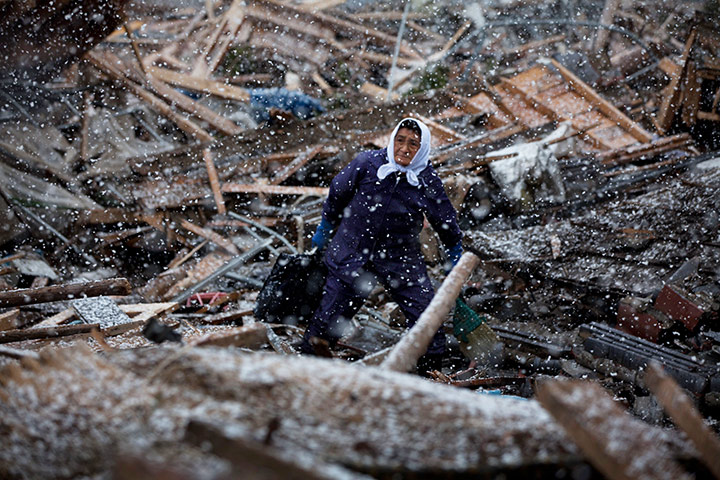
-
Tom, How you spend your own money is your own business. I have already accepted your original proposal, that is to "pay for me (that is you) to fly to Japan". It seems to me that you are attempting to back down by renegotiating these terms. We don't need a contract, an escrow account will do. Just stick to your original proposal and the deal is done.
In fact, there should be risk on your part to perform. That you should deposit in escrow the same amount payable to me if you fail to follow through.
-
Wow, dueling pistols at dawn:
I think everyone has made their point. Time to go back to nice, lazy sketching and code writing.
Best wishes,
Bob
-
The BBC has at last published some useful stuff about radiation levels, what a 'millisievert' is and how many we get or should be concerned about getting etc http://www.bbc.co.uk/news/health-12722435
Even then though they don't keep it simple, and talk about exposure to 'Grays' [which I had mistakenly thought flew UFOs ] and then go back to 'mSv' per year, hour, lifetime, single-dose etc which make comparisons awkward...
] and then go back to 'mSv' per year, hour, lifetime, single-dose etc which make comparisons awkward...This other site tries to explain Grays and mSv and introduces rads and rems to confuse us http://www.jplabs.com/html/units_of_radiation.HTM little wonder the Fukushima techniciams reported levels 1,000,000 times higher that allowed but retracted it saying it was an error [never heard what they actual decided it was
 ] - all those bloody calculations and units [1 rem = 1000 mrem = 10 mSv = 0.01 Sv & 0.1 rad = 100 mrad = 1 mGy = 0.001 Gy & a Gray ~= sV, said the BBC ?]... and of course, 'Radioactivity is measured in Becquerels (Bq) per second. 1 Bq means one disintegration per second. It is also measured in Curie (Ci), named for Madam Curie, who shared Nobel Prize with her husband. 1 Curie = 3.7 x 1010 Bq or disintegrations per second'... these are then completely ignore on favor of the latest fashion 'Sieverts' et al, with no clue about their relationships [if any].... place your bets please...
] - all those bloody calculations and units [1 rem = 1000 mrem = 10 mSv = 0.01 Sv & 0.1 rad = 100 mrad = 1 mGy = 0.001 Gy & a Gray ~= sV, said the BBC ?]... and of course, 'Radioactivity is measured in Becquerels (Bq) per second. 1 Bq means one disintegration per second. It is also measured in Curie (Ci), named for Madam Curie, who shared Nobel Prize with her husband. 1 Curie = 3.7 x 1010 Bq or disintegrations per second'... these are then completely ignore on favor of the latest fashion 'Sieverts' et al, with no clue about their relationships [if any].... place your bets please... 
This is a another related table http://www.jplabs.com/html/natural___typical_exposures.html -
Pistols? No, no, no.
No duelling pistols quite yet (or duelling 'handbags' as we once put it

 )
)It has been made clear that I'm not going to get a penny out of Honolulu, and I probably never will.
However, this could be a fantastic oppotunity to change a lot of opinions (although I'd far prefer to change the world through debate and eating radioactive spinach). So what have I got to loose?
I've written to my friend in Tokyo and meanwhile, I am writing to the Japanese Embassy in London. I may get laughed at, and not taken seriously- far too dangerous they'll probably say, and I'd argue that it would avert attention away from all these fools and all that, but that would be missing the point wouldn't it?
I haven't the money to pull off an event like this, so If anyone wants to sponsor me, lets go for it.

-
TEPCO finally asks for help international companies who sold the plant!
But it's not too late when Plutonium is now seeping through?
There were 17 days losted!
I am absolutly desolated to be right from the beginning!
Good luck to them, good luck to us, because the worst is now following! -
Doomed I tell you! We're all DOOOMED!

[flash=425,344:27menrtp]http://www.youtube.com/v/FgsPzydgzxE?fs=1&hl=en_GB&fs=1&&[/flash:27menrtp]
-
Today that we can hear on the radio at midday in Europe
"Japan gouvernment says : reactors 1,2,3 out of control"
Does this reassuring? -
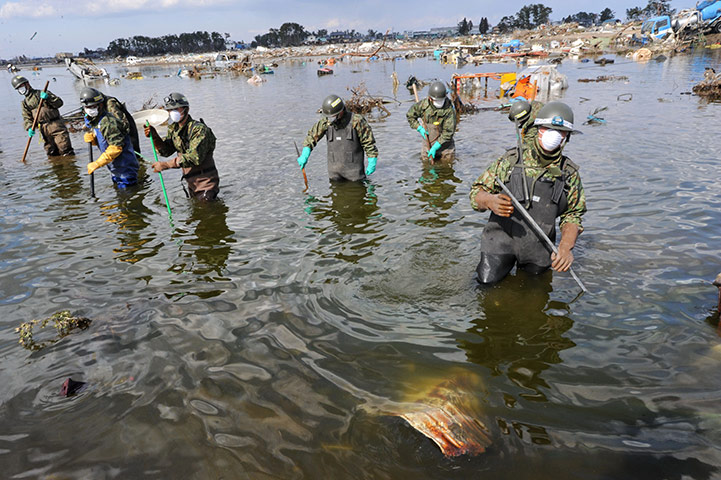
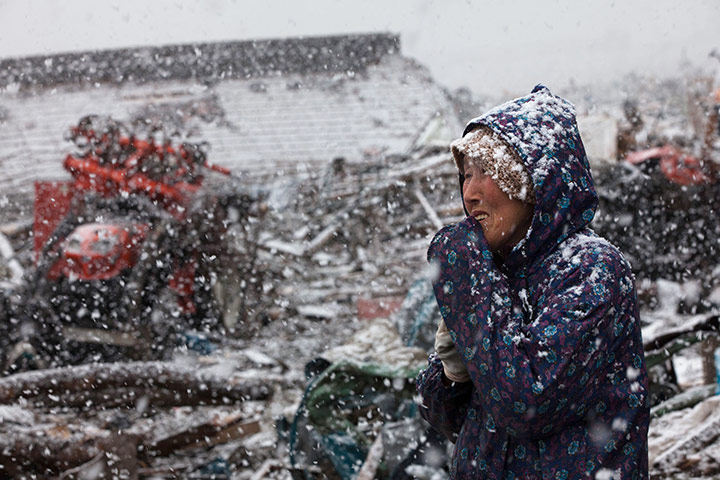
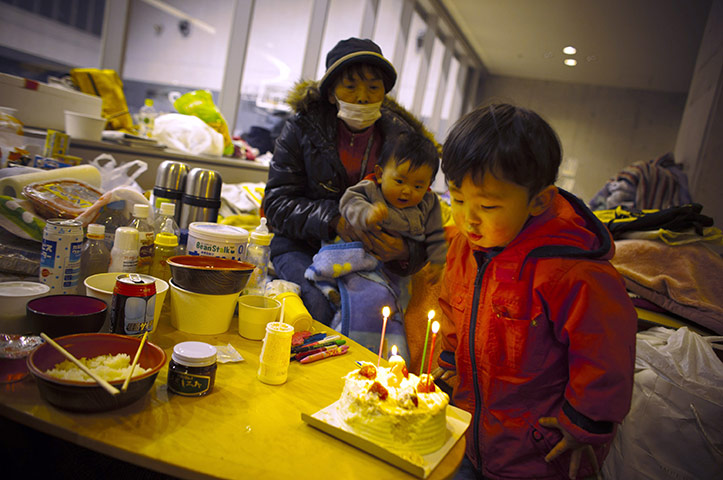
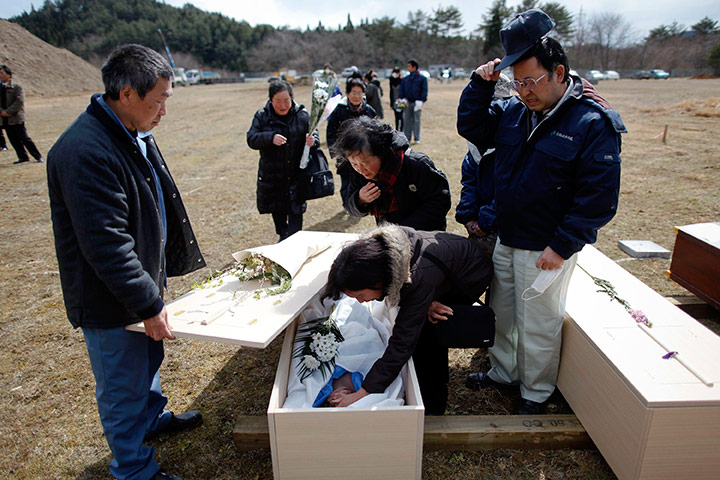
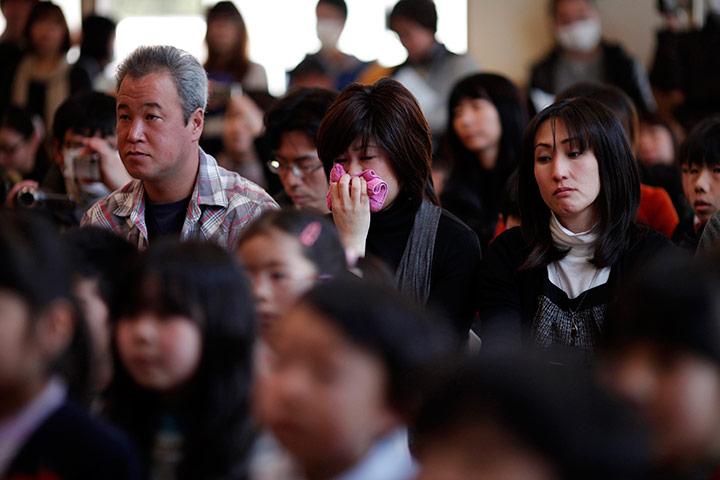
Dead because of a giant tsunami caused by a magnitude 8.9 earthquake. Despite a few 'problems' (mainly exaggerated by the western press), not one fatality caused by nuclear 'fallout' or radioactivity from Fukushima. Pilou, Do these images not speak to you (I don't see anyone in 'radiation suits' either!)?

-
Grief and desolations.
My japan friends will appreciate "a few 'problems'" at the end of the chain
Seism-->Tsunami-->reactors melting -
@unknownuser said:
Today that we can hear on the radio at midday in Europe
"Japan gouvernment says : reactors 1,2,3 out of control"
Does this reassuring?Pilou, I think you hear, what you want to hear!
This is what the latest BBC report says (@ 16:33 29-03-11);
@unknownuser said:
Water levels in underground tunnels adjoining reactors 1, 2 and 3 had been stable, the agency said.
Reactor 1: Damage to the core from cooling problems. Building holed by gas explosion. Highly radioactive water detected in reactor
Reactor 2: Damage to the core from cooling problems. Building holed by gas blast; containment damage suspected. Highly radioactive water detected in reactor and adjoining tunnel
Reactor 3: Damage to the core from cooling problems. Building holed by gas blast; containment damage possible. Spent fuel pond partly refilled with water after running low. Highly radioactive water detected in reactor
Plutonium: Found at five locations in soil - levels said to represent no danger to human health
The above statement is completely open to interpretation. Highly radioactive water detected in reactor? Well that's hardly surprising is it? I see nothing about all three reactors being 'out of control'. It says nothing new at all.
Emphasis again on this more important news item (although that really should be at the top of the page);
@unknownuser said:
The massive 9.0-magnitude quake and the tsunami on 11 March are now known to have killed more than 11,000 people, with at least 16,700 people still missing across north-eastern Japan.
Advertisement








